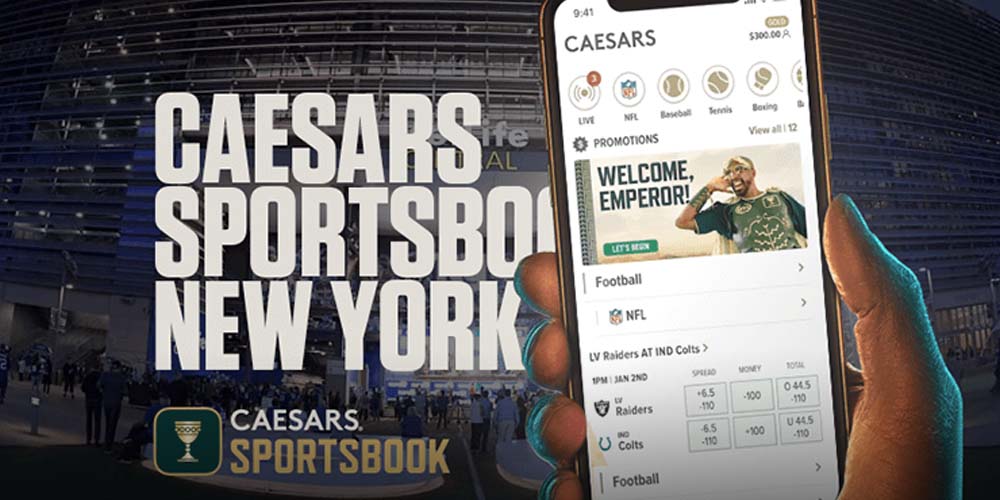Promotional Spending Pays Early Dividends For NY Sportsbooks

- Caesars Sportsbook staked their claim as New York’s mobile sportsbook market leader shortly after launch, largely as a result of unprecedented promotional spending.
- While this promotional spending allowed Caesars to capture a large sector of market share, a new report indicates that high promotional spending may be a death sentence for the market.
ALBANY, N.Y. - When New York launched its mobile sportsbooks on January 7, many predicted that the state would soon become the largest sports betting market in the United States.
While few predicted the short amount of time it would take for New York to claim that title, some sportsbook operators were convinced of the importance of a successful launch in New York early on.
As a result, the operators that focused their efforts on the New York launch are now seeing it pay dividends.
Caesar Rules New York
The operator that leaned into the launch of online sportsbooks in New York with the greatest effect was Caesars Sportsbook. Having experience with a previous high-profile launch in Arizona, the company understood the importance of staking a market share early.
Caesars also understood that perhaps the best way to grab market share in the early days after launch is through promotional spending.
For four months before launch, New Yorkers were bombarded with targeted advertisements featuring a high-profile New Yorker in J.B. Smoove.
Caesars also aired separate commercials on national broadcasts, hoping to cast a wide net. The company locked up advertising partnerships with Madison Square Garden, the New York Knicks, and the New York Rangers as well. The duration of these advertising campaigns likely played a big role in Caesars’ strong launch.
And that was just the beginning of their promotional spending. Perhaps the more consequential move the company made was their launch sign-up bonus.
Throughout New York, billboards informed potential bettors of their relatively generous $300 free bet sign-up bonus. They also offered up to $3,000 in free play funds through various promotional codes.
These enticing sign-up bonuses - combined with massive spending on advertising - led to some incredible early results for the sportsbook.
In the first nine days after New York launched their legal sports betting sites, Caesars raked in a $257 million handle, good for 43% of all wagers placed.
The next closest competitor, FanDuel, handled 33% of the wagers in that period. DraftKings came in at 22% of the total handle and BetRivers brought in just 2%.
Interestingly, these percentages strongly correlate with the size of the sign-up bonus offered by each sportsbook. The top sportsbook, Caesars, offered a total of $3,300 in bonuses. FanDuel and DraftKings offered $1,000 in bonuses. BetRivers, who captured just 2% of the market at launch, offered just $250 in bonuses.
Is This Level Of Promotional Spending “Insane”?
Bally’s Chairman Soo Kim seems to think so. Originally expected to launch just after the first batch of sportsbooks - alongside BetMGM and PointsBet - the chairman has decided to delay their launch until at least April, forgoing their opportunity to rake in massive handles on two of the biggest sports betting events of the year - the Super Bowl and March Madness.
This is directly a result of what he considers an unprofitable environment spurred on by excessive promotional spending. However, Kim is far from the only one that sees this level of promotional spending as excessive and unsustainable.
Sports betting analysis firm Regulus Partners released a statement on the newly-launched New York mobile sportsbook market; in it, they laid out exactly why they believe these sportsbooks are shooting themselves in the foot with such levels of promotional spending.
They also claimed that early indicators of success, such as high gross gaming revenues, are not as positive as they seem because they were spurred on by unsustainable promotional spending.
“The distortions to customer expenditure vs. betting volumes are quite hard to articulate at the policy level, and so as an additional trap, N.Y. is likely to see big volumes being presented as a sign of ‘success’ rather than a more nuanced direction of travel, in our view.” read the statement said.
The excessive bonusing will not just harm the sportsbooks that offered huge free play funds, such as Caesars, but the industry as a whole, according to the firm’s statement.
Still Time For Sportsbooks To Reverse Promotional Spending Course
While it is hard not to get a desperate impression based on the report, it is not all bad news. The high tax rate ensures that even if operators flounder and struggle to generate a profit, the state will still rake in millions in tax revenue, which is surely a positive.
And, according to the report, it could take some time for the negative effects of the promotional spending to catch up with operators. As a result, there may still be time for operators to dial back on their promotional spending.
Caesars was able to capture a large share of the legal gambling market; however, if the Regulus Partners report turns out to be accurate, the company may be wishing they went with the BetRivers approach.
